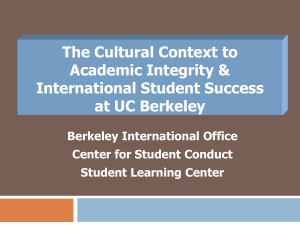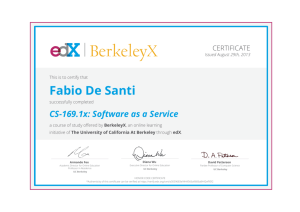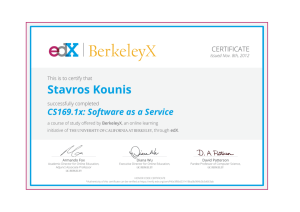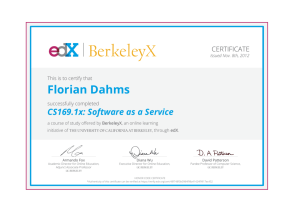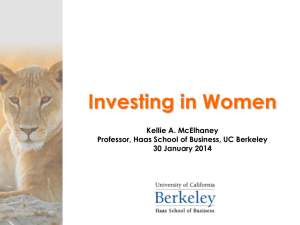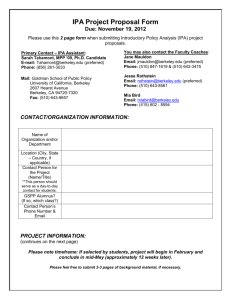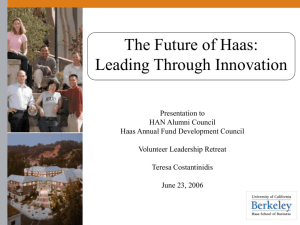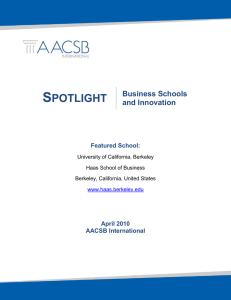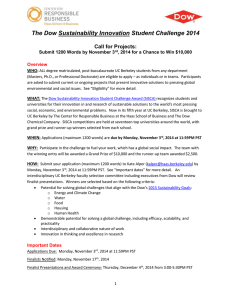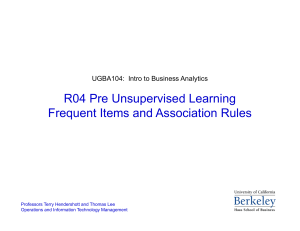December 13, 2005 - Center for Responsible Business
advertisement
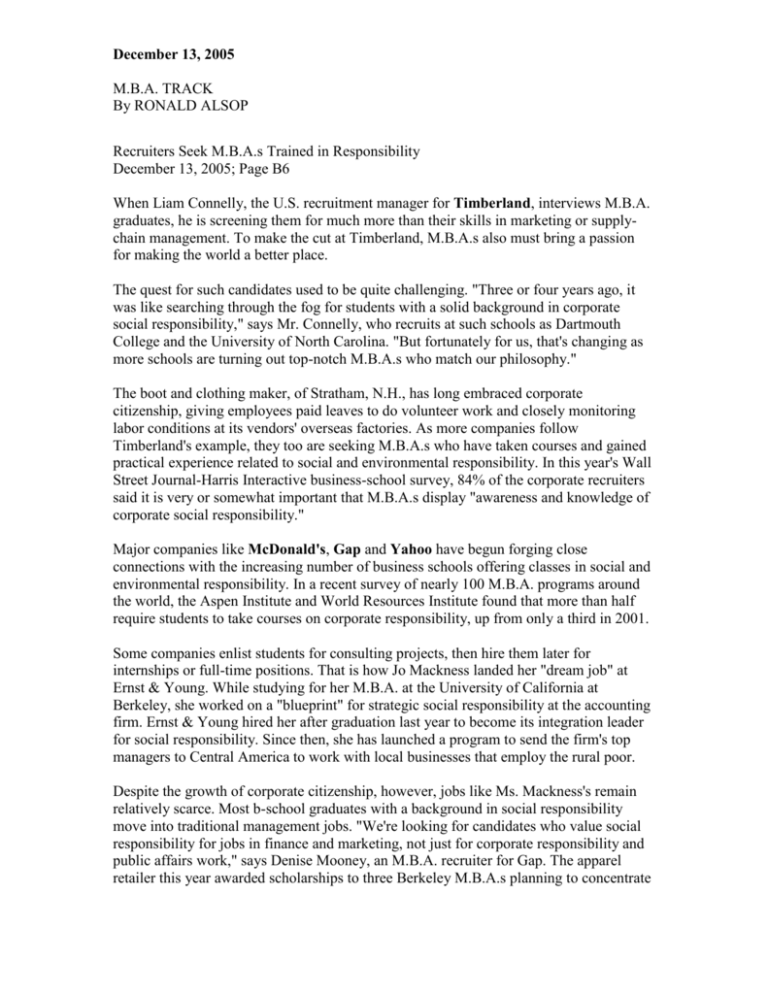
December 13, 2005 M.B.A. TRACK By RONALD ALSOP Recruiters Seek M.B.A.s Trained in Responsibility December 13, 2005; Page B6 When Liam Connelly, the U.S. recruitment manager for Timberland, interviews M.B.A. graduates, he is screening them for much more than their skills in marketing or supplychain management. To make the cut at Timberland, M.B.A.s also must bring a passion for making the world a better place. The quest for such candidates used to be quite challenging. "Three or four years ago, it was like searching through the fog for students with a solid background in corporate social responsibility," says Mr. Connelly, who recruits at such schools as Dartmouth College and the University of North Carolina. "But fortunately for us, that's changing as more schools are turning out top-notch M.B.A.s who match our philosophy." The boot and clothing maker, of Stratham, N.H., has long embraced corporate citizenship, giving employees paid leaves to do volunteer work and closely monitoring labor conditions at its vendors' overseas factories. As more companies follow Timberland's example, they too are seeking M.B.A.s who have taken courses and gained practical experience related to social and environmental responsibility. In this year's Wall Street Journal-Harris Interactive business-school survey, 84% of the corporate recruiters said it is very or somewhat important that M.B.A.s display "awareness and knowledge of corporate social responsibility." Major companies like McDonald's, Gap and Yahoo have begun forging close connections with the increasing number of business schools offering classes in social and environmental responsibility. In a recent survey of nearly 100 M.B.A. programs around the world, the Aspen Institute and World Resources Institute found that more than half require students to take courses on corporate responsibility, up from only a third in 2001. Some companies enlist students for consulting projects, then hire them later for internships or full-time positions. That is how Jo Mackness landed her "dream job" at Ernst & Young. While studying for her M.B.A. at the University of California at Berkeley, she worked on a "blueprint" for strategic social responsibility at the accounting firm. Ernst & Young hired her after graduation last year to become its integration leader for social responsibility. Since then, she has launched a program to send the firm's top managers to Central America to work with local businesses that employ the rural poor. Despite the growth of corporate citizenship, however, jobs like Ms. Mackness's remain relatively scarce. Most b-school graduates with a background in social responsibility move into traditional management jobs. "We're looking for candidates who value social responsibility for jobs in finance and marketing, not just for corporate responsibility and public affairs work," says Denise Mooney, an M.B.A. recruiter for Gap. The apparel retailer this year awarded scholarships to three Berkeley M.B.A.s planning to concentrate on corporate responsibility. The Haas School of Business at Berkeley attracts both recruiters and students because of its social and environmental focus. In fact, a quarter of this year's incoming M.B.A. students said they chose Haas because it offers some 30 courses with social or environmental content, including "Social Entrepreneurship" and "Business Strategies for Emerging Markets." One of the most popular classes -- "Strategic Corporate Responsibility" -- requires students to perform consulting projects for clients as diverse as the Detroit Lions football team and sandal-maker Birkenstock. Students explore such issues as socially responsible investing, human rights, strategic philanthropy and public/private partnerships. But Haas doesn't aim to simply turn out tree-hugging do-gooders. After all, recruiters still most value team players with leadership potential and sharp communication and analytical skills. "I'm hearing from more companies that want M.B.A.s who are solid general managers first, but who also get the importance of social responsibility," says Kellie McElhaney, executive director of the Center for Responsible Business at Berkeley. "In the past, they picked insiders in operations or marketing and found that many of those people couldn't make the leap to such issues as human-rights assessment and engagement with NGOs [nongovernmental organizations]." This year McDonald's started a research fellowship program at Berkeley, selecting six students to study the social, environmental and financial aspects of the beef supply chain. "They're looking at the supply chain from fork to farm," says Bob Langert, senior director of social responsibility at the fast-food company. "We created the fellows program because we believe it's key for business schools to develop a sensitivity to societal issues in future business leaders. We knew from direct experience that the Haas School has the capacity to work well with business." M.B.A. graduates say their degree gives them greater credibility when they try to spread social responsibility throughout a company. Unlike many people who move into the corporate world from nonprofit organizations, M.B.A.s can speak the language of business and relate social responsibility to brand management, corporate strategy and financial analysis. "My M.B.A. gives me the knowledge and confidence to discuss corporate social responsibility in a way that resonates with business leaders," says Erin Carlson, a Berkeley graduate and manager of Yahoo for Good, a program that helps connect Yahoo users with worthy causes. "Whatever I do here at Yahoo has to not only make a positive impact on the world but also make business sense." Write to Ronald Alsop at ron.alsop@wsj.com1
